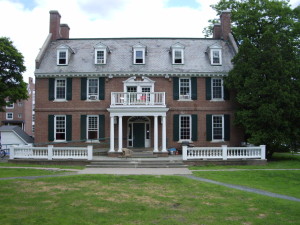
We take it for granted that the administration and student body will always be adversaries to a certain degree. But we should be fed up with, and frankly, wary of an administration that habitually sells out student life to pay for its PR addiction.
On April 3, a full ten days before the Organizational Adjudication Committee (OAC) handed down its decision to the brothers of Alpha Delta, AD’s house advisor Larry W. Weidner II ’85 penned a letter to brief the brotherhood on the administration’s outlook.
Interim Dean Ameer has already stated in a letter to the fraternity that it matters not what the Judicial Counsel decides because she “has it within her power and will do what she thinks is in the College’s best interests.”
Of course, one can imagine that the high-stakes climate did at least as much to stoke Mr. Weidner’s fears as Dean Ameer’s specific words. But there’s good reason to believe his account. As The Dartmouth Review explored in “The State of (Judicial) Affairs”, a retrospective piece in our last issue, the only common thread running through the Beta, Phi Delt, and Zete derecognitions was a lack of clear due process. Public information about the shape of OAC proceedings is vanishingly rare. And the barebones outline that the College does provide seems designed to allow our top administrators to make whatever decision they choose.
Shocking as this may be to the unseasoned souls of tamer social circles, it appears that the ADs themselves knew the drill quite well. Reports from Weidner himself and elsewhere suggest that some members of the active brotherhood preferred to self-derecognize rather than circle the wagons for a hopeless fight.
Desperation of this sort could and should have changed the administrator’s calculus with regard to AD’s future. Even if the brothers were not quite prepared to disband, there can be no doubt that they would have greeted any terms of reform that OAC brought to the table. In return for the College’s mercy, AD could have been fined for past indiscretions but also pointed in the direction of positive reforms like real, intimate faculty advisement and mandatory public service.
These solutions would have been a much better fit for AD’s “crimes.” The idea that AD has been a “persistent headache” for the College and has failed to “shape up” is a platitude that probably traces all the way back to the Animal House days. But from a critical perspective, do we really believe that serving alcohol to minors, voluntary branding, and meeting while on probation should be punished with extermination?
A constructive approach to AD’s violations would also have been more consistent with the spirit of Moving Dartmouth Forward as President Hanlon described it. If Hanlon truly does not “believe that simply eliminating [Greek life] would be a comprehensive, or even effective solution to the more pervasive challenges we face,” then he should direct his administrators to relax their trigger fingers with regard to each house.
OAC’s claim of independence aside, you can bet the house that Hanlon signed off on the verdict. That being known, it’s a shame that Hanlon of all people, proud AD brother that he was, couldn’t stay his own hand from dropping the hammer when it clearly needn’t have dropped. His willingness to make that call suggests that he either possesses a subtle anti-Greek zeal, which is unlikely, or that he caved under the pressure to appeal to the media, which would be much more in keeping with Hanlon’s public character.
We take it for granted that the administration and student body will always be adversaries to a certain degree. But we should be fed up with, and frankly, wary of an administration that habitually sells out student life to pay for its PR addiction. Their job is to manage the College at the top level, and applications and donations depend on good press. But it should be as obvious to administrators as it is to students that Dartmouth ought not be a mere perpetual motion machine, with a constant churn of diplomas and dollars but no rich student experience to justify them. The day AD’s doors closed was another step toward that hollowing out of student life. And we can expect many more with newly promoted Vice Provost Ameer at the helm of student affairs, whether they come in the form of additional derecognitions or more subtle incursions.
Though he’s wisely allowed Ameer to play the attack dog, Hanlon’s role in all this is by far the most disappointing. Some will surely praise him for daring to bring his own fraternity to heel. After all, isn’t dissent the highest form of allegiance?
We at The Review disagree, and suggest that dissent is only productive when it’s based in the true highest form of allegiance, which is love. Love that engages one’s most difficult problems with constructive solutions, rather than banishing them with a detached dispassion. With regard to his fraternity and student life in general at his Alma Mater, it’s unclear whether Hanlon has any love of this sort to give. Day by day, he’s begun to resemble the poor subject of Sir Walter Scott’s poem:
Breathes there the man, with soul so dead,
Who never to himself hath said,
This is my own, my native land!
Whose heart hath ne’er within him burn’d,
As home his footsteps he hath turn’d,
From wandering on a foreign strand!

Be the first to comment on "“Breathes There the Man”"